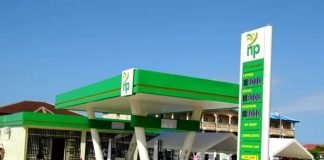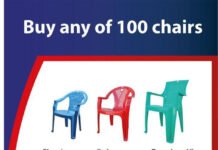By Amin Kef Sesay
It has been widely agreed and endorsed that the National Petroleum Sierra Leone Limited (NP-SL Ltd) is without any iota of doubt one of the companies that falls within the category of Sierra Leone’s successful indigenous companies.
NP-SL, many have attested, has been hugely contributing towards overall national development, particularly in the areas of job creation, timely payment of taxes to Government via the National Revenue Authority (NRA) as well as the steady and meaningfully rolling out of its Corporate Social Responsibility that are all positively impacting on the socio-economic development of the country.
Indeed, if it has taken quite a considerable period of time since this country has not been experiencing fuel shortage, then such could be largely attributed to the pro-active and sterling initiatives that the Management of NP-SL has been executing with regards timely procurement of petroleum products and making such available on the market for public consumption.
Without holding any brief for NP, it is highly commendable for a well-established and result-producing company like NP to have ascended to such an enviable position, especially when cognizance is taken of the fact that it is exclusively owned by Sierra Leonean shareholders, a typical testimony of how local entrepreneurs could raise the bar high.
Interestingly, the members of staff referred to were workers of the former British Petroleum Company, an entity that later decided to sell its shares to the Government of Sierra Leone at that material period of time.
Things took another dimension when in 1996 the Government sold its 60% shares in NP to some members of staff who were working for the company. Again it was made known that 55 % was paid upfront from the end of service benefits of the workers from BP and the 5% offered to all the other workers. Thus the company known as LEONEOIL was born.
The 55% sale of Government shares to NP came as a result of the World Bank’s advice to privatize the company. It was also revealed that among the 4 companies that bid, which included ELF, LEONOIL won the international competitive bidding conducted by Arthur De Little, a United States based Management consultancy firm hired by the World Bank.
It could be recalled that the World Bank, which advised Government to privatize NP, monitored the bidding process for the three international companies and one local company that competed culminating in LEONEOIL, which metamorphosed to NP, meeting all the set criteria.
Economists this medium had the privilege to talk to noted that the aforementioned members of staff were indeed serious enough to properly manage the company to such an extent that, unlike others, it survived most of the challenges that it had been bedeviled with.
Further digging into the historical background of NP, in a bid to give readers the opportunity to see how it has become so successful, it came out glaringly that the 40% PMMC’s stake in the company, owned by the late Jamil Sahid Mohammed and Tony Yazbeck, was given as collateral for a loan from a Bank by one of the parties.
The controversial and highly influential, Jamil Sahid Mohammed, later sold to Cape Oil PMMC’s 40% shares to offset a fidelity loan, but LEONE OIL was not satisfied with that move and took the matter to court on the grounds that it was in violation of the M and A which dictates that the other side has the first option to buy. The outcome of the matter was that the High Court gave judgement in favour of Leone Oil.
For reasons best known to them, certain individuals have been peddling rumors that NP has a monopoly over the petroleum market in the country, but such have been proven baseless and misleading, as it is factual that there are other Marketing Companies marketing petroleum products that are registered with the Petroleum Regulatory Agency.
It is worthy for readers to note that Petro-Leone is a storage company developed by both Addax and Leone Oil so that petroleum products will always be available in the country and avert shortage. Experts further state that if such a venture is disrupted, the country will relapse to the former state of shortage of fuel and long queues will once more re-surface across the country, causing a lot of inconvenience and national hiccups.
Currently, NP has filling stations in different parts of the country and is even operating in some countries within the West African sub-region namely: Guinea, Liberia, Ivory Coast and The Gambia, delivering qualitative services and sales.
The company has really etched a name for itself because of its unique ways of rolling out customer care, which has been rated as the best and have earned it the reputation of 1st for customer care. Quick responses to queries and concerns always go like lightening, leaving those trying to find out very satisfied. This proactive stance by the company had placed it at a vantage position to make informed decisions that have contributed greatly to the growth of the business entity.
To make cooking simple the company introduced what has now become a household companion and here we are talking of NP Gas, a device that is in line with best practice, as it is non-hazardous, environmentally friendly and easy to refill. Designed in different cylinder sizes they could be accessed at the company’s Filling Stations and authorized dealers.
Still in a bid to make fuel transaction convenient for its numerous customers, it introduced what today has gained currency, NP Smart Card. With this card, a particular customer could purchase a required quantity of petroleum product, especially diesel and petrol as long as the card contains money. Key advantages of using this device are saving time and providing security from any financial scam.
It could be seen that starting from a humble beginning the NP-SL as an indigenous petroleum marketing company has now become a towering business entity within the West African sub-region.




